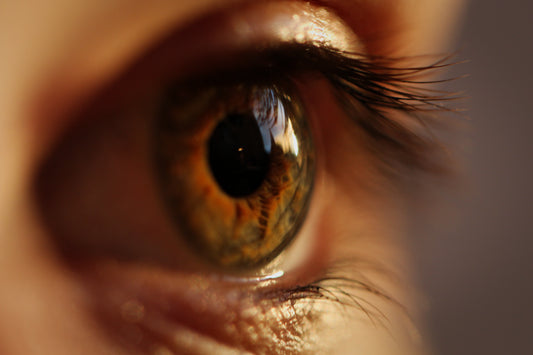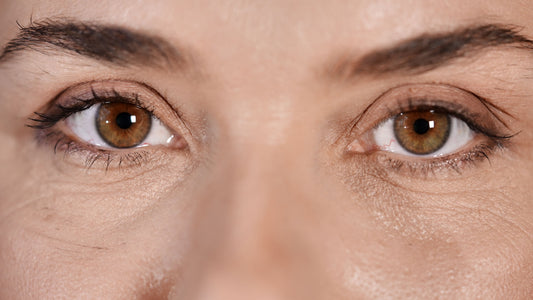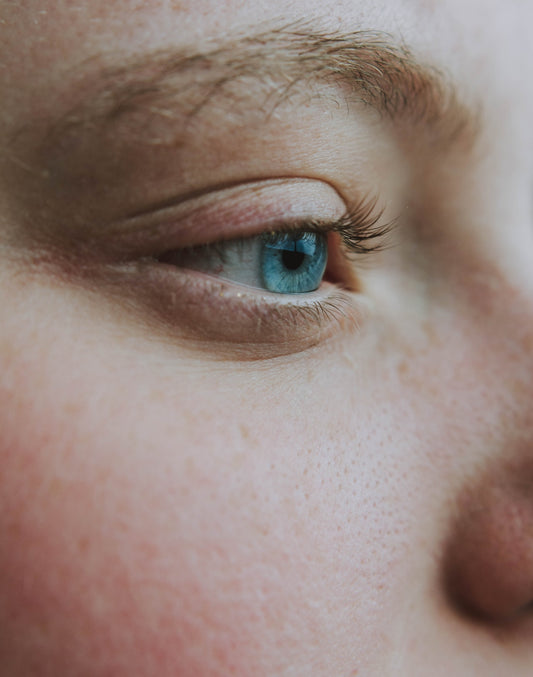Have you ever looked in the mirror and wished that your eyelashes were longer and fuller? You're not alone.
Sparse and short lashes can be a frustrating and confidence-damaging issue. If you're one of the many people who struggle with this problem, it's important to understand what causes it and what you can do to improve the fullness and length of your lashes.
One major factor that can contribute to sparse and short lashes is genetics. Some people simply have thinner, shorter lashes due to their DNA. If your family members also struggle with thin or short eyelashes, there's a good chance that genetics could be the culprit behind your own lash issues.
Another cause of sparse and short lashes is aging. As we get older, our hair follicles tend to slow down their production of new hair, including eyelashes. This means that even if you had long, full lashes in your youth, they may become sparser as you age.
Other factors that can impact the health and appearance of your eyelashes include nutrition, stress levels, sleep deprivation, medical conditions like alopecia or thyroid disorders, and certain beauty treatments like lash extensions or harsh makeup removers. In upcoming sections of this article, we'll explore these factors in greater detail and discuss tips for enhancing eyelash length and density.
Sparse and short lashes can be caused by genetics, environmental factors, and poor nutrition.
The Genetic Puzzle: Why Some Have Sparse and Short Lashes
Some people are born with naturally long and thick eyelashes, while others struggle with sparse and short lashes. Genetics play a significant role in determining the length and thickness of your lashes.
If your parents have thin or sparse lashes, you are likely to inherit the same traits. Eyelash follicles have a genetic limit for how long and thick they can grow.
The size, shape, and number of hair follicles present on your eyelids is predetermined by your genes. Those with fewer hair follicles will naturally have thinner lashes.
It is important to understand that there is no permanent cure for sparse or short eyelashes if it's due to genetics. However, there are some tips for enhancing the look of sparse lashes:
Using mascara can create the appearance of longer and fuller lashes by coating each hair strand in dark pigment. False eyelashes are also an option; they come in various lengths and styles which can be customized to meet one's preference.
Genetics play a massive role in determining eyelash length, density and thickness. Those who have inherited thin or short lashes should not lose hope as there are various options available that can enhance the appearance of their natural eyelashes such as mascara or false ones.
Aging: Its Unseen Effects on Eyelash Length and Fullness
As we age, our bodies undergo many changes that can impact the health and appearance of our eyelashes. One of the most noticeable effects of aging is a decrease in eyelash length and fullness. This happens because as we get older, the hair follicles on our eyelids become smaller and less active.
This means that the lashes that grow from these follicles are thinner, shorter, and fewer in number. In addition to changes in hair follicle activity, aging can also cause other factors to come into play that contribute to sparse and short lashes.
For example, as we get older, our skin loses elasticity and becomes drier. This can lead to brittle lashes that are more prone to breaking or falling out.
Makeup and beauty treatments can also play a role in how our eyelashes age. Mascara, false lashes, lash extensions – all of these things can put stress on our natural lashes over time.
If you're someone who has been using these products for years without giving your natural lashes a break every now and again, it's possible that this could be contributing to your sparse or short lash situation. Fortunately, there are steps you can take to combat the effects of aging on your eyelashes:
One option is to use an eyelash serum containing peptides or growth factors; these ingredients have been shown to stimulate hair growth and improve overall lash health over time. You may also want to consider switching up your makeup routine – for example by using a gentler mascara formula or skipping false lashes altogether – in order to give your natural lashes some much-needed breathing room!
Mascara and eyelash extensions can temporarily enhance lashes but may cause damage if not used or removed properly.
Stress and Sleep: Their Hidden Role in Eyelash Health

It's not a secret that stress and sleep deprivation can wreak havoc on your physical and emotional health. But did you know that they can also affect the appearance of your eyelashes?
Stress causes an increase in the hormone cortisol, which can lead to hair loss, including your eyelashes. When you're under stress, you may also rub your eyes more frequently, which can further damage your lashes.
Lack of sleep is another factor that can cause sparse and short lashes. During sleep, our bodies repair damaged cells and produce growth hormones.
If you're not getting enough restful sleep, this process may be interrupted, leading to weaker lashes. Additionally, when we don't get enough sleep, our eyes can become dry and irritated, causing us to rub them more often.
If you're experiencing stress or are having trouble sleeping at night, there are several things you can do to help improve the health of your eyelashes. One tactic is to practice relaxation techniques like yoga or meditation before bed to help reduce stress levels.
Additionally, make sure you're getting enough restful sleep each night by establishing a consistent bedtime routine and avoiding caffeine or alcohol in the evening. When it comes to caring for your eyelashes during times of stress or poor sleep quality – be gentle!
Avoid rubbing your eyes throughout the day as much as possible since this will further weaken already fragile lashes. And if needed use an oil-based makeup remover instead of harsh rubbing alcohol based removers to avoid damaging them further.
While it's hard to avoid all forms of stress during our daily lives – learning how to manage it better is undoubtedly worth it for many reasons beyond just healthy looking eyelashes! Making a few lifestyle changes such as incorporating regular exercise into daily routines and taking breaks throughout workdays could go a long way in helping prevent lash loss due from high-stress levels.
Sleep deprivation and stress can weaken eyelash health.
The Plate and Your Lashes: How Nutrition Affects Eyelash Growth
Nutrition plays a significant role in the growth and development of eyelashes, just like it does with the rest of our body. A deficiency in essential vitamins and minerals can lead to sparse and short lashes. Vitamins E, B6, B12, C, D, and biotin are particularly important for healthy lash growth.
These vitamins help to strengthen hair follicles by providing them with necessary nutrients. Protein is also an essential nutrient for eyelash health.
Lashes are made up of keratin protein, which is why it's important to include enough protein in your diet. Foods that are rich in protein include fish, lean meat, eggs, beans, and nuts.
Foods that contain omega-3 fatty acids are also beneficial for promoting healthy lashes. Omega-3s help to improve blood circulation and reduce inflammation which can lead to healthier hair follicles.
Some examples of foods that contain omega-3s include salmon, tuna, chia seeds, flaxseeds and walnuts. What you eat can have a significant impact on the health of your eyelashes.
A well-balanced diet consisting of fruits, vegetables, lean proteins and whole grains will not only promote overall health but also aid in achieving fuller thicker lashes naturally! So next time think twice before reaching out for junk food if you want those long desirable lashes!
Beauty Regimens: Their Unintended Consequences on Eyelashes
Many people turn to beauty regimens to enhance their appearances. From face masks to nail polish, there are countless treatments and products available on the market today. However, some of these beauty routines may have unintended consequences on eyelashes.
One such treatment that can affect eyelashes is lash extensions.
While they may provide an instant boost in length and volume, the weight of the extensions can cause natural lashes to fall out prematurely. Additionally, the glue used to attach the extensions can irritate the skin around the eyes and lead to inflammation and infection.
Another common beauty product that can impact eyelash health is mascara.
While mascara can give a dramatic look by making lashes appear thicker and longer, it can also cause clumping and breakage. The constant rubbing required to remove mascara at night can also lead to lash loss over time.
Eyelash curlers are another tool that many people use in their beauty routines. However, repeated use of an eyelash curler can weaken lashes over time and make them more prone to breakage or falling out altogether.
While it's understandable that people want to enhance their features with beauty treatments, it's important to consider how these treatments might affect overall lash health in the long run. In order to maintain healthy lashes while still enjoying a full range of beauty routines, it's recommended that individuals use high-quality products with natural ingredients whenever possible and give their lashes a break from heavy treatments on occasion.
Consider the causes and make informed decisions when choosing treatments for lash enhancement.
Health Conditions and Their Unexpected Impact on Eyelashes
Medical conditions can take a toll on your overall health, but did you know that they can also affect your eyelash growth? Medical conditions such as hypothyroidism and alopecia areata have been linked to thinning or loss of eyelashes. Hypothyroidism slows down the metabolism, leading to hair loss not only on the scalp but also on the eyebrows and eyelashes.
Alopecia areata is an autoimmune disorder that causes hair loss in patches all over the body, including eyelashes. If you notice sudden or patchy loss of your lashes, it’s important to consult a dermatologist.
Another condition that affects lash health is blepharitis. This is an inflammation of the eyelid that can cause itching and flaking, which in turn leads to breakage or stunted growth of lashes. The American Optometric Association recommends gentle cleansing of lids with mild baby shampoo or tea tree oil solutions to avoid further damage.
Chemotherapy drugs used in cancer treatment can also impact lash growth and quality.
Chemotherapy affects rapidly growing cells including hair follicles leading to temporary hair loss all over the body including eyebrows and lashes. Lash regrowth usually starts after chemotherapy is discontinued, however it may take several months for full regrowth.
Medical conditions can have unexpected impacts on our bodies including our eyelash growth. If you notice any changes in your lash density or quality without apparent reasons such as makeup use or aging then it's important to consult with a physician.
Meanwhile gentle cleansing along with proper nutrition could help keep those precious hairs healthy until medical treatment options could be explored if necessary. Tips and treatments for enhancing eyelash length and density include using natural oils such as castor oil which has been found to enhance eye-lash length while conditioning for long-term healthy lashes
The Mind-Lash Connection: How Psychology Affects Eyelash Health
When it comes to our eyelashes, there's much more at play than simply our genetics, age, and nutrition. In fact, our psychological state can also affect the health of our lashes. Stress and anxiety can be a major contributor to sparse and short lashes.
When we're feeling stressed or anxious, it's common for us to engage in certain behavior that can negatively impact our lash health. For example, rubbing or pulling at our lashes can cause them to become weak and prone to falling out.
Sleep deprivation is another psychological factor that affects eyelash health. When we don't get enough sleep, our bodies produce more cortisol which can weaken the hair follicles and lead to thinner and shorter lashes over time.
This is why it's important to prioritize getting enough restful sleep each night if you want your lashes looking their best. Researchers have found that the placebo effect can also play a role in improving eyelash length and density.
In one study, participants were given a placebo serum for their lashes but were told that it was an actual growth serum. At the end of the study period, researchers found that these participants actually experienced an increase in lash length and fullness - even though they had only received a placebo treatment.
While genetic factors certainly play a role in the thickness and length of our eyelashes - there are many other factors that come into play as well. By paying attention to how we manage stress levels - taking steps like practicing meditation or engaging in activities we enjoy - prioritizing getting enough quality sleep each night - we can help ensure that our lashes stay healthy (and looking great!) over time!
Turning the Tide: Proven Strategies for Longer, Fuller Eyelashes

If you're struggling with sparse and short lashes, don't despair! There are plenty of ways to boost their length and fullness.
Here are some proven strategies to help turn the tide:
First up is nutrition. What you eat can have a big impact on the health of your lashes. Make sure you're getting plenty of vitamins A and C, which are essential for healthy hair growth.
Foods like sweet potatoes, carrots, spinach, and citrus fruits can all help boost lash health. You might also consider taking a biotin supplement - this B vitamin is known to promote hair growth.
Another factor to consider is makeup and beauty treatments. While things like mascara and lash extensions can make your lashes look longer in the short term, they can also have unintended consequences over time.
Heavy use of mascara can dry out lashes and lead to breakage, while lash extensions can damage follicles and cause lashes to fall out prematurely. If you do use these products, make sure to remove them gently at night and avoid rubbing your eyes too vigorously.
Of course, there are plenty of treatments specifically designed to enhance eyelash length and density. Lash serums containing ingredients like biotinoyl tripeptide-1 or prostaglandin analogs have been shown to be effective in promoting lash growth.
These products should be used consistently over several weeks for best results. In addition to these strategies, it's important to remember that psychological factors can also play a role in eyelash health.
Stress and sleep deprivation may contribute to lash loss or breakage - so make sure you're getting enough rest! And if you find yourself rubbing your eyes frequently due to anxiety or other psychological factors, try incorporating some stress-reduction techniques into your daily routine.
Overall, there are many ways to boost the length and fullness of your eyelashes - from nutrition changes to beauty treatments to stress reduction. By taking a holistic approach and being consistent in your efforts, you can achieve the lush lashes you've always wanted.
Conclusion
It is clear that there are many different factors that can contribute to sparse and short lashes.
From genetics and aging to stress and medical conditions, there are a variety of causes that can impact the health and appearance of your eyelashes. However, the good news is that there are also many different tips and treatments for enhancing eyelash length and density.
In addition to eating a balanced diet, you may also consider taking supplements or using lash-enhancing products that contain key nutrients like biotin and vitamin E. Another important factor to consider when it comes to eyelash health is stress and sleep deprivation.
Overall, while sparse or short lashes may seem like a trivial concern compared to other health issues you may be facing, they can actually have a significant impact on your overall appearance and confidence level. By taking care of yourself both inside and out with proper nutrition, stress management techniques, lash-enhancing treatments, and beauty routines that don't harm them as a result those tips above, you'll be well on your way to achieving longer, fuller lashes that help you feel great about yourself every day!
Frequently Asked Questions
Q: What causes sparse and short lashes?
A: Sparse and short lashes can be caused by a variety of factors including genetics, aging, stress, poor nutrition, damage from makeup and beauty treatments, and certain medical conditions.
Q: Can my diet affect the length and fullness of my lashes?
A: Yes, your diet plays a significant role in the health of your lashes. A balanced diet rich in proteins, vitamins, and minerals can promote healthier and fuller lashes.
Q: How does stress affect the health of my lashes?
A: Chronic stress can negatively impact the health of your lashes, potentially leading to lash loss and slower growth, resulting in sparse and short lashes.
Q: Can certain beauty treatments cause sparse and short lashes?
A: Yes, certain beauty treatments like eyelash extensions and the use of waterproof mascara can damage the lashes and lead to lash loss, resulting in sparse and short lashes.
Q: Are there any proven strategies for achieving longer, fuller lashes?
A: Yes, maintaining a balanced diet, managing stress, practicing good eyelash care, and using lash-enhancing products can all contribute to achieving longer, fuller lashes.




